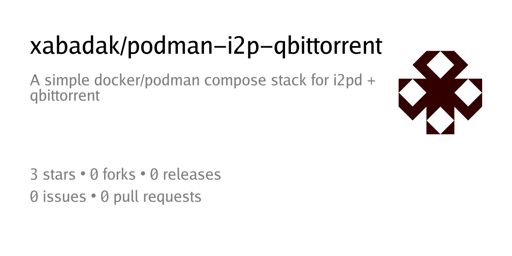- cross-posted to:
- selfhosted@lemmy.world
- cross-posted to:
- selfhosted@lemmy.world
Thought I would share my simple docker/podman setup for torrenting over I2P. It’s just 2 files, a compose file and a config file, along with an in-depth explanation, available at my repo https://codeberg.org/xabadak/podman-i2p-qbittorrent. And it comes with a built-in “kill-switch” to prevent traffic leaking out to the clearnet. But for the uninitiated, some may be wondering:
What is I2P and why should I care?
For a p2p system like bittorrent, for two peers to connect to each other, at least one side needs to have their ports open. If one side uses a VPN, their provider needs to support “port forwarding” in order for them to have their ports open (assuming everything else is configured properly). If you have ever tried to download a torrent with seeders available, yet failed to connect to any of them, your ports are probably not open. And with regulators cracking down on VPNs and forcing providers like Mullvad to shut down port forwarding, torrenting over the clearnet is becoming more and more difficult.
The I2P network doesn’t have these issues. The I2P is an alternative internet network where all users are anonymous by default. So you don’t need a VPN to hide your activity from your ISP. You don’t need port-forwarding either, all peers can reach each other. And if you do happen to run a VPN on your PC, that’s fine too - I2P will work just the same. So if you’re turning your VPN on and off all the time, you can keep I2P running throughout, and continue downloading/uploading.
I2P eliminates all the complications and worries about seeding, making it easy for beginners to contribute to the network. I2P also makes downloading easier, since all peers are always reachable. And it’s more decentralized too, since users don’t need to rely on VPN providers. And of course, it’s free and open source!
A fair warning though, I2P is restricted in some countries. And in terms of torrenting specifically, torrents have to explicitly support I2P. You can’t just take any clearnet torrent and expect it to work on I2P. And the speeds are generally lower since there are less seeders, and the built-in anonymity has a cost as well. However I’ve been surprised at the amount of content on the I2P network, and I’ve been able to reach 1 MB/s download speeds. It’s more than good enough for me, and it will only get better the more people join, so I hope this repo is enough for people to get started.



Thanks for the info, I would not claim to be an expert about I2P so some of this is definitely new to me. Though I think the situation has improved quite a bit.
If you just want I2P without the torrenting, you can use the official I2P router, which is just an HTTP proxy that runs on your PC, just like Tor. The 3rd-party router used in my guide, i2pd, has a Flatpak as well. So as far as installing the router goes, it’s a few clicks. You are correct that it does require configuring the browser though, you are correct. This is explained in my guide and also on the official website. Not as easy as clicking an “Install” button, but only takes around 5 minutes. I wish there were an official I2P browser like the Tor browser though.
Not sure what you mean by this. I’ve never had to log into anything to set up I2P.
I have no doubt. But Tor has had many vulnerabilities too. Both have gotten much better over time.
Definitely true. In fact it makes me suspicious how fast TOR is despite how many users there are, and how the relatively high requirements to be a relay (not to mention an exit node). AFAIK TOR is heavily reliant on rich and generous patrons, which makes me wonder about the motives of these patrons. I believe I2P has the potential to be much more decentralized, since every user is expected to also be a router, and Techlore has also raised this point (though I don’t have the video on me right now).
I didn’t know this. What are indexed sites?